Modern organizations generate vast amounts of knowledge—emails, reports, customer interactions, and insights—yet much of it remains scattered or lost.
Without effective enterprise knowledge management systems, this deluge can overwhelm employees, leading to inefficiencies and missed opportunities.
Lacking a structured approach to manage this information results in employees spending excessive time searching for data, duplicating efforts, and making uninformed decisions.
So, how do you solve that? What software tools can help? Let’s discuss all that and more.
What Is Enterprise Knowledge Management?
Enterprise Knowledge Management (EKM) is the process of capturing, organizing, and sharing an organization’s collective knowledge. It involves leveraging technology, processes, and best practices to ensure employees can easily access the information they need to make informed decisions.
EKM covers many knowledge assets, including internal documentation, policies, customer insights, project data, and industry expertise. By centralizing and structuring this information, organizations can enhance collaboration, reduce redundancies, and improve operational efficiency.
For example, a multinational corporation with teams across different regions may struggle with inconsistent information and communication gaps. By implementing an enterprise knowledge management system, the company can create a single repository where employees can find updated guidelines, training materials, and best practices.
What Are the Key Parameters of Enterprise Knowledge Management?
Effective Enterprise Knowledge Management (EKM) ensures that valuable organizational knowledge is systematically captured, stored, and shared efficiently. Here are its key parameters:
Knowledge Capture
The first step in knowledge management is gathering and documenting critical insights from employees, customer interactions, and business processes. This includes structured data (manuals, reports, databases) and unstructured data (emails, chats, informal discussions).
AI-powered knowledge bases can help automate knowledge capture by extracting relevant information from different sources and converting it into searchable content.
Knowledge Storage
Once knowledge is captured, it needs a centralized and secure repository for easy retrieval. Enterprise knowledge bases, cloud storage solutions, and document management systems ensure information is organized, categorized, and version-controlled for seamless access.
A well-structured knowledge storage system prevents duplication and ensures critical knowledge remains intact even as employees leave or transition roles.
Knowledge Sharing
Knowledge loses value if it remains siloed. A strong knowledge-sharing culture ensures that employees across departments can collaborate, contribute, and access relevant information whenever needed.
Role-based permissions, discussion forums, and AI-driven recommendations in knowledge management systems enable seamless sharing while maintaining security and compliance.
Knowledge Accessibility & Searchability
Knowledge must be easily discoverable for it to be useful. Implementing an intelligent search system with AI-driven suggestions, filters, and indexing improves content discoverability.
Businesses should also ensure knowledge resources are accessible across devices, enabling employees to retrieve information anytime, anywhere.
Knowledge Governance & Compliance
Managing enterprise knowledge requires structured policies and governance to ensure accuracy, security, and compliance.
This includes defining content ownership, approval workflows, and access control policies to prevent unauthorized modifications or data breaches. Regular audits help maintain knowledge integrity and regulatory compliance across industries.
Knowledge Measurement & Optimization
Tracking a knowledge management system’s usage, effectiveness, and gaps is essential for continuous improvement.
Analytics tools provide insights into frequently accessed content, knowledge gaps, and engagement trends, helping businesses refine their strategy and ensure their knowledge base remains relevant and up-to-date.
What Are the Ways Enterprise Knowledge Management Helps Your Business?
Enterprise knowledge management (EKM) centralizes and optimizes knowledge-sharing, ensuring employees can effortlessly access, utilize, and build upon critical information. Here’s how EKM benefits your business:
Improves Productivity & Efficiency
Employees spend valuable time searching for information. A well-structured knowledge base with AI-powered search capabilities reduces time spent looking for answers, enabling teams to focus on execution rather than information retrieval.
Enhances Decision-Making
With centralized, well-organized knowledge, businesses can make data-driven decisions faster. Access to past insights, case studies, and best practices helps leaders and employees make informed choices that align with business goals.
Optimizes Employee Collaboration & Knowledge Sharing
EKM encourages a collaborative culture by breaking down silos and making knowledge easily accessible across departments.
Features like wikis, discussion forums, and shared knowledge repositories allow employees to contribute insights and learn from one another.
Streamlines Employee Onboarding & Training
New hires often struggle to get up to speed quickly. A knowledge management system provides on-demand access to training materials, FAQs, and process documentation, reducing the learning curve and ensuring smooth onboarding.
Reduces Redundancy & Prevents Knowledge Loss
When employees leave, valuable knowledge often goes with them. EKM systems capture and store critical institutional knowledge, ensuring that key processes, insights, and best practices remain accessible even as teams change.
Improves Customer Support & Experience
A well-maintained knowledge base helps support teams resolve customer queries faster by providing access to FAQs, troubleshooting guides, and product documentation.
Self-service portals also empower customers to find answers independently, improving satisfaction and reducing support tickets.
Ensures Compliance & Risk Management
For industries with strict regulatory requirements, EKM ensures that the latest compliance guidelines, policies, and standard operating procedures (SOPs) are easily accessible and regularly updated, minimizing legal risks.
Encourages Innovation & Continuous Improvement
By capturing and analyzing insights from past projects, customer feedback, and industry trends, businesses can identify areas for improvement and innovation. A knowledge-sharing culture fosters continuous learning and adaptability.
Integrates Seamlessly with Business Tools
Modern EKM systems integrate with CRM, ERP, and collaboration tools to ensure knowledge is embedded within daily workflows. This enhances efficiency by allowing employees to access relevant information without switching platforms.
What Are Some Methods & Techniques to Adopt in Enterprise Knowledge Management?
Effective Enterprise Knowledge Management (EKM) ensures that information is captured, stored, shared, and utilized efficiently.
Organizations can foster collaboration, innovation, and informed decision-making by adopting the proper methods and techniques. Below are key strategies to enhance your EKM approach.
Centralized Knowledge Repositories
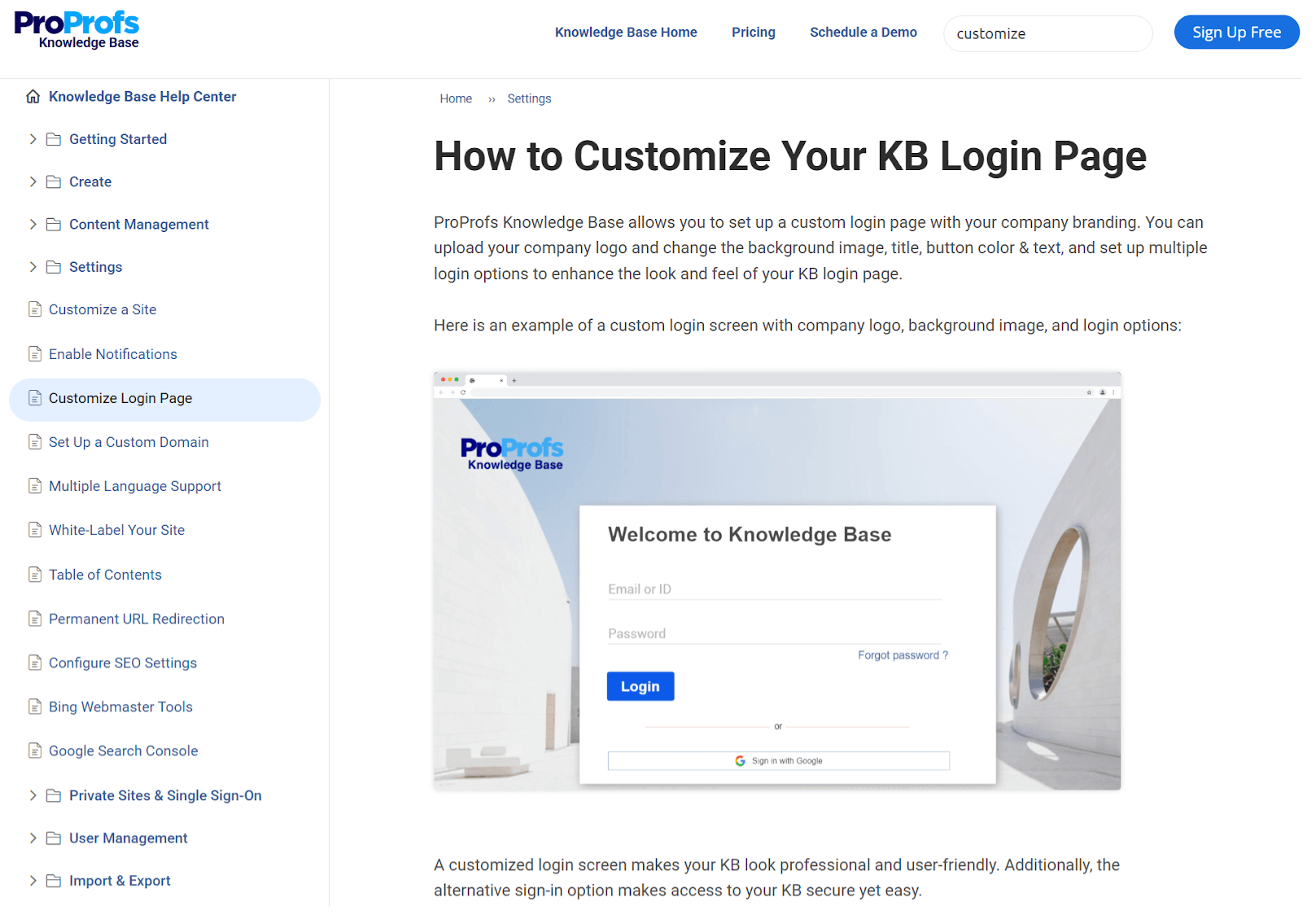
A centralized knowledge repository is a single source of truth, ensuring employees have quick access to reliable, up-to-date information. This can take the form of:
- Cloud-based knowledge bases (such as ProProfs Knowledge Base, Confluence, or SharePoint)
- Enterprise wikis that allow teams to document and edit information collectively
- Document management systems (DMS) that store SOPs, guides, and policies
By keeping everything well-organized, searchable, and accessible, businesses prevent knowledge loss and duplication and increase overall efficiency.
AI-Powered Search & Automation
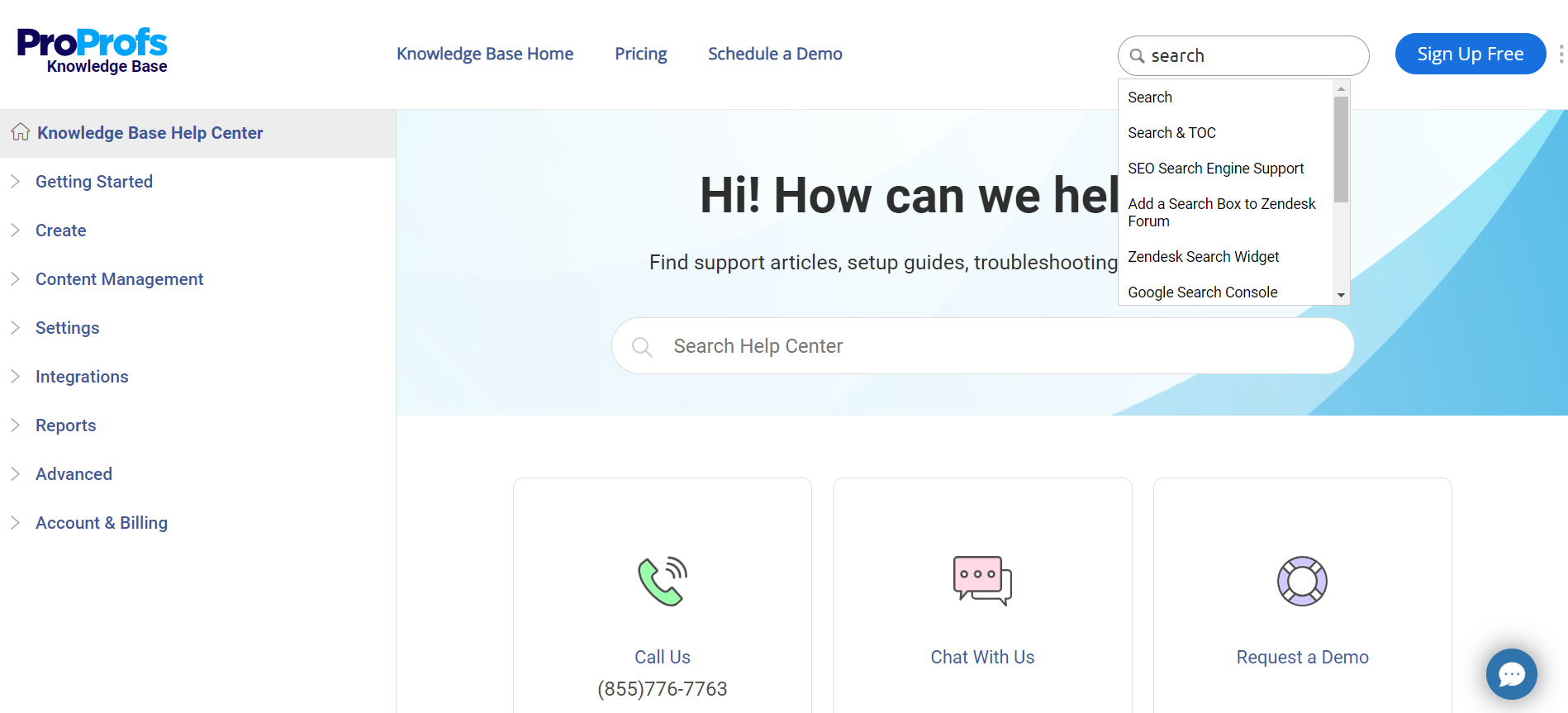
Traditional keyword-based searches often fail to retrieve relevant results. AI-powered search engines solve this problem using:
- Natural Language Processing (NLP) to understand queries and retrieve the most relevant content
- Auto-tagging and categorization to structure unorganized data intelligently
- Automated knowledge recommendations based on user behavior, past searches, and frequently accessed topics
Automation ensures that employees spend less time searching and more time applying the knowledge, improving productivity.
Knowledge Mapping & Categorization
Large enterprises generate an overwhelming amount of information. A structured knowledge map ensures that information is easy to navigate by:
- Categorizing knowledge into relevant topics and subtopics for quick discovery
- Using metadata, tags, and taxonomies to enhance searchability
- Linking related content so employees can explore interconnected knowledge efficiently
Without clear categorization, employees may struggle to find crucial information, leading to inefficiencies and knowledge silos.
Collaborative Knowledge Sharing Platforms
A knowledge-driven organization thrives on collaboration. Platforms like:
- Discussion forums (e.g., Slack, Microsoft Teams, or internal Q&A boards) allow employees to share insights
- Shared workspaces where teams co-create documents, guides, and training materials
- Social learning tools where employees interact and exchange expertise
Open discussions and knowledge sharing prevent information bottlenecks and enhance team learning.
Expert Networks & Communities of Practice (CoPs)
Identifying and leveraging subject matter experts (SMEs) within the company strengthens knowledge transfer. CoPs are voluntary, knowledge-sharing communities where experts:
- Discuss trends, challenges, and solutions in their domain
- Create knowledge artifacts like best practice guides and research reports
- Mentor junior employees, ensuring expertise is transferred efficiently
These networks preserve organizational knowledge, preventing loss when employees leave.
Documented Workflows & Standard Operating Procedures (SOPs)
Without documented workflows, knowledge often exists in people’s heads, leading to inconsistencies. SOPs and workflows:
- Ensure process consistency, reducing operational errors
- Speed up employee onboarding, providing step-by-step guidance for tasks
- Reduce dependency on individuals, making teams more self-sufficient
A structured approach to documenting business processes fosters scalability and efficiency.
Real-Time Knowledge Capture & Updates
A static knowledge base becomes obsolete quickly. Real-time knowledge updates ensure content stays fresh by:
- Integrating with chatbots and helpdesks that capture FAQs dynamically
- Allowing instant content editing and versioning to reflect the latest processes
- Automating update reminders to ensure periodic content reviews
This approach keeps information relevant, up-to-date, and valuable, reducing errors caused by outdated data.
Data Analytics & Performance Tracking
Understanding how knowledge is used helps optimize the knowledge management strategy. Advanced analytics track:
- Which articles are most accessed and which are ignored?
- Common search terms and failed searches highlight knowledge gaps
- Employee engagement with learning content, showing effectiveness
Organizations can use data-driven insights to improve content, restructure navigation, and enhance accessibility.
Gamification & Incentives
Employees may hesitate to contribute knowledge without incentives. Gamification strategies motivate participation by:
- Rewarding contributions with badges, points, or leaderboards
- Recognizing top contributors in company-wide meetings or newsletters
- Creating friendly competitions to encourage knowledge-sharing
This fosters a culture of knowledge sharing, increasing employee engagement.
Seamless Integration with Business Tools
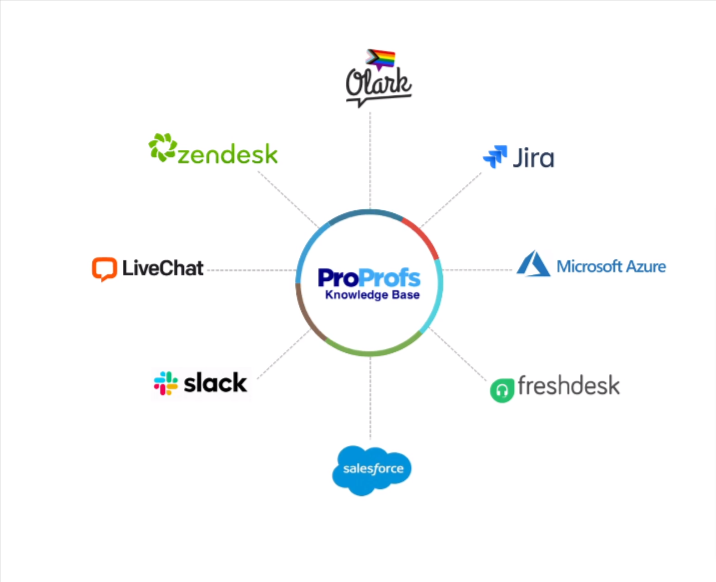
Knowledge is only valuable if employees can access it within their workflow. Seamless integrations with CRM, ERP, and communication tools ensure that:
- Customer service teams get instant access to troubleshooting guides from their helpdesk software.
- Sales teams retrieve playbooks and competitive insights within their CRM.
- Employees access policies and FAQs directly from Slack, Teams, or their intranet.
By embedding knowledge into everyday tools, businesses eliminate friction and improve efficiency.
FREE. All Features. FOREVER!
Try our Forever FREE account with all premium features!
What Are Some Software or Tools to Implement Enterprise Knowledge Management Successfully?
Enterprise knowledge management systems help organizations capture, organize, and distribute information efficiently, ensuring employees and customers can easily access the knowledge they need. Here are some tools you can consider for your business:
1. ProProfs Knowledge Base – Best for Easily Creating Help Sites, Manuals & Private Knowledge Bases
ProProfs Knowledge Base is equipped with an AI-powered WYSIWYG editor, which helps efficiently create and manage user manuals and FAQs (public, private, embedded inside your app/software, or integrated with chat). It also lets you add images, videos, and links directly into the documents.
The platform offers powerful search functionality with auto-suggest and advanced filters, helping users find the information they need quickly and easily. It allows for creating structured categories and folders, making navigating large volumes of documents easy.
What You Will Like:
- A wide range of knowledge base templates to help you create knowledge base articles easily
- Revision history to track up to 30 recent changes made to your knowledge base
- Supports real-time collaboration with internal comments for collaborative editing
- The ability to control the layout, format, and presentation of your knowledge base with the help of CSS.
What You May Not Like:
- No downloadable or on-premise version
- A dark user interface option is not available.
Pricing:
Forever Free plan with all the premium features for up to 25 articles. Paid plan starts at $49/author/month
2. Nuclino – Best for Fast Collaboration to Bring Knowledge, Docs & Projects Together in One Place
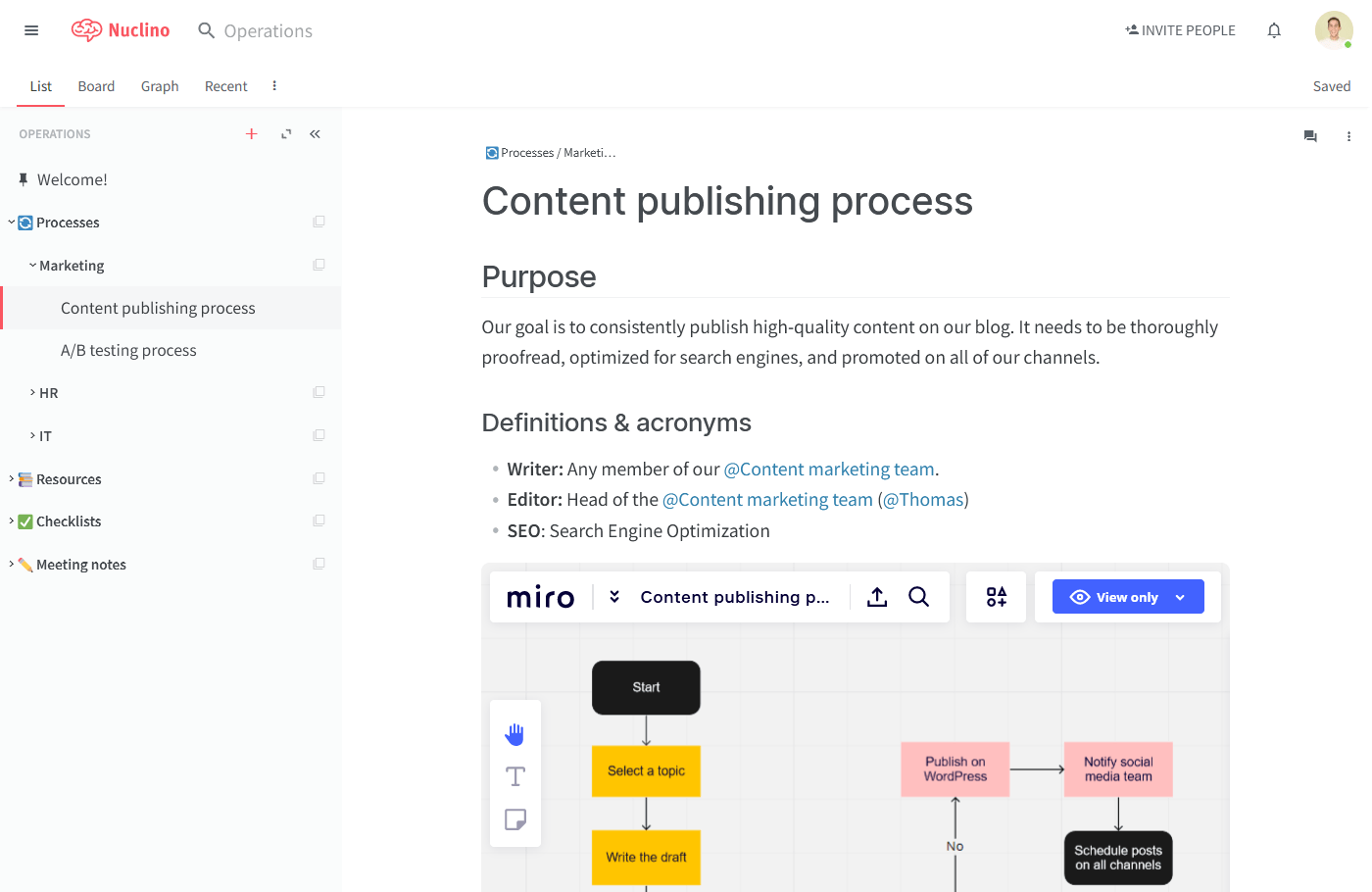
Nuclino is a lightweight and collaborative knowledge management tool designed to help teams centralize, organize, and access information effortlessly. Its intuitive interface and real-time editing capabilities make it easy for businesses to create a structured knowledge base, ensuring that important information is always up-to-date and accessible.
One of Nuclino’s standout features is its real-time collaborative editing, which allows multiple users to work on the same document simultaneously. The platform’s unique graph visualization allows you to visually link related documents and create a network of interconnected knowledge
What You Will Like:
- Version history enhances knowledge management by allowing users to track changes and revert to previous versions if needed
- Enables structuring and organizing information through graph-based visualization and wiki-style documentation
- Encourages knowledge discovery by connecting related topics, helping employees quickly find what they need without relying solely on search queries.
What You May Not Like:
- Lacks an offline mode, which can be a problem for users needing to access documentation offline
- Lack of extensive customization options for the interface and workspace.
Pricing:
Paid plan starts at $6/user/month.
3. GetGuru – Best for Connecting Company’s Collective Knowledge
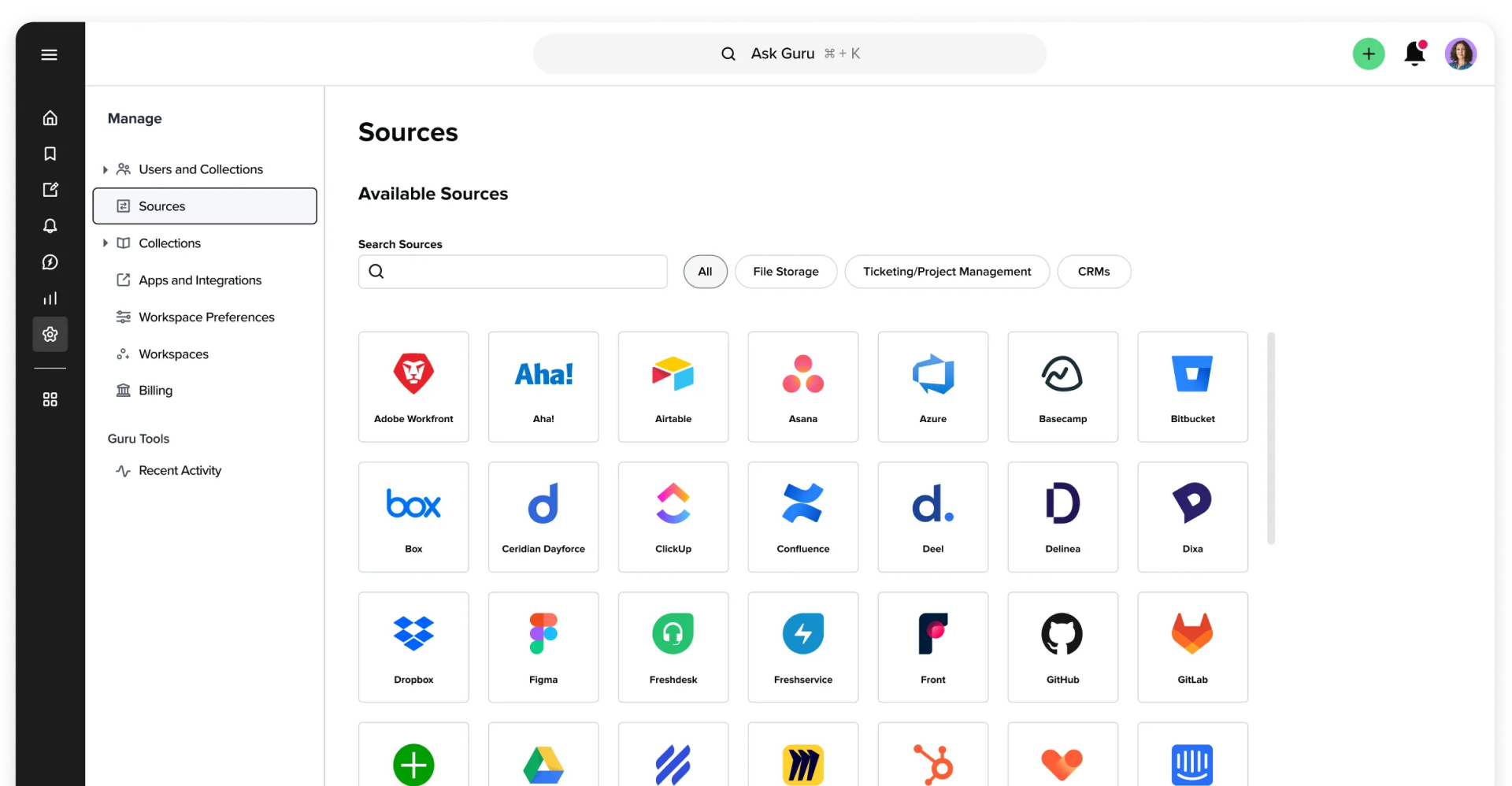
GetGuru‘s AI Suggest feature proactively surfaces relevant knowledge based on an employee’s work context. Whether responding to a customer email, working on a sales proposal, or onboarding a new hire, GetGuru’s AI analyzes the situation and suggests relevant knowledge cards, eliminating the need for time-consuming searches and reducing knowledge gaps.
The platfrom also emphasizes knowledge accuracy and trust. Its verification engine automatically notifies subject matter experts to review and update knowledge, ensuring that information remains current and reliable. This eliminates the risk of outdated or inaccurate information, fostering confidence in the knowledge shared across the organization.
What You Will Like:
- Seamlessly with popular workplace applications like Slack, Microsoft Teams, and Salesforce
- Detailed reports helps identify the most frequently accessed information, knowledge gaps, and user engagement trends information is readily available
- Users comment and ask questions on the Guru cards.
What You May Not Like:
- Adding videos to Cards can be complicated
- Limited UI customization options.
Pricing:
Paid plan starts from $10/month.
What Are the Future Trends in Enterprise Knowledge Management?
As businesses evolve in digital transformation, enterprise knowledge management (EKM) is shifting towards more intelligent, adaptive solutions. Here are the key trends shaping the future of EKM.
AI-Powered Knowledge Management
Artificial intelligence is revolutionizing EKM with intelligent search, automated content tagging, and predictive recommendations.
AI-driven assistants can analyze user queries, retrieve the most relevant information, and generate responses, making knowledge retrieval faster and more intuitive.
Decentralized & Collaborative Knowledge Sharing
Traditional hierarchical knowledge structures are giving way to peer-driven, decentralized knowledge networks.
Companies leverage collaborative wikis, discussion forums, and social learning platforms to enable employees to contribute, validate, and refine knowledge in real time.
Personalized Knowledge Experiences
Instead of one-size-fits-all knowledge bases, organizations adopt personalized knowledge portals that deliver customized content based on user roles, behavior, and preferences.
AI-driven content recommendations and adaptive learning paths ensure employees get relevant information without sifting through irrelevant data.
Integration with Enterprise Systems
Knowledge management is no longer a standalone function. Businesses are integrating their knowledge bases with CRM, ERP, HR, and helpdesk systems to ensure seamless information flow across departments.
This reduces redundancies and enhances productivity by embedding knowledge within everyday workflows.
Automation for Knowledge Capture & Maintenance
Manually updating and managing knowledge repositories is inefficient. Organizations leverage automation to capture knowledge from emails, chat logs, and support tickets.
AI-driven maintenance tools can detect outdated information and suggest updates, ensuring knowledge bases remain current and reliable.
Advanced Security & Compliance Measures
With increasing concerns over data privacy and regulatory compliance, EKM systems are adopting blockchain for secure knowledge transactions, AI-driven access controls, and real-time compliance monitoring.
These measures protect sensitive enterprise knowledge while maintaining accessibility for authorized users.
Voice & Conversational Interfaces
The rise of voice search and AI chatbots transforms how employees access knowledge.
Instead of typing queries, users can leverage voice assistants and conversational AI to retrieve answers instantly, making knowledge management more interactive and accessible.
Emphasis on Knowledge-Driven Decision Making
Organizations are shifting from knowledge storage to knowledge intelligence—using analytics to measure knowledge effectiveness and inform decision-making.
Predictive insights, data visualization, and knowledge impact assessments are becoming integral to business strategies.
Improve Knowledge Sharing & Collaboration with Enterprise Knowledge Management
Enterprise knowledge management is critical for organizations seeking to thrive in today’s competitive landscape. By effectively capturing, sharing, and utilizing knowledge, businesses can empower their employees, streamline operations, and drive innovation.
Implementing a robust knowledge management system, fostering a knowledge-sharing culture, and leveraging appropriate methods and techniques are essential for successful enterprise knowledge management.
ProProfs Knowledge Base offers a powerful solution with its user-friendly interface, robust features, and seamless integrations. Explore the tool more and request a demo today!
 Tips
Tips
We’d love to hear your tips & suggestions on this article!
FREE. All Features. FOREVER!
Try our Forever FREE account with all premium features!
 We'd love your feedback!
We'd love your feedback! Thanks for your feedback!
Thanks for your feedback!







